Over the past year, major study abroad destinations have changed many policies related to enrollment and created opportunities for international students to stay and work, with much good news for Vietnamese people.
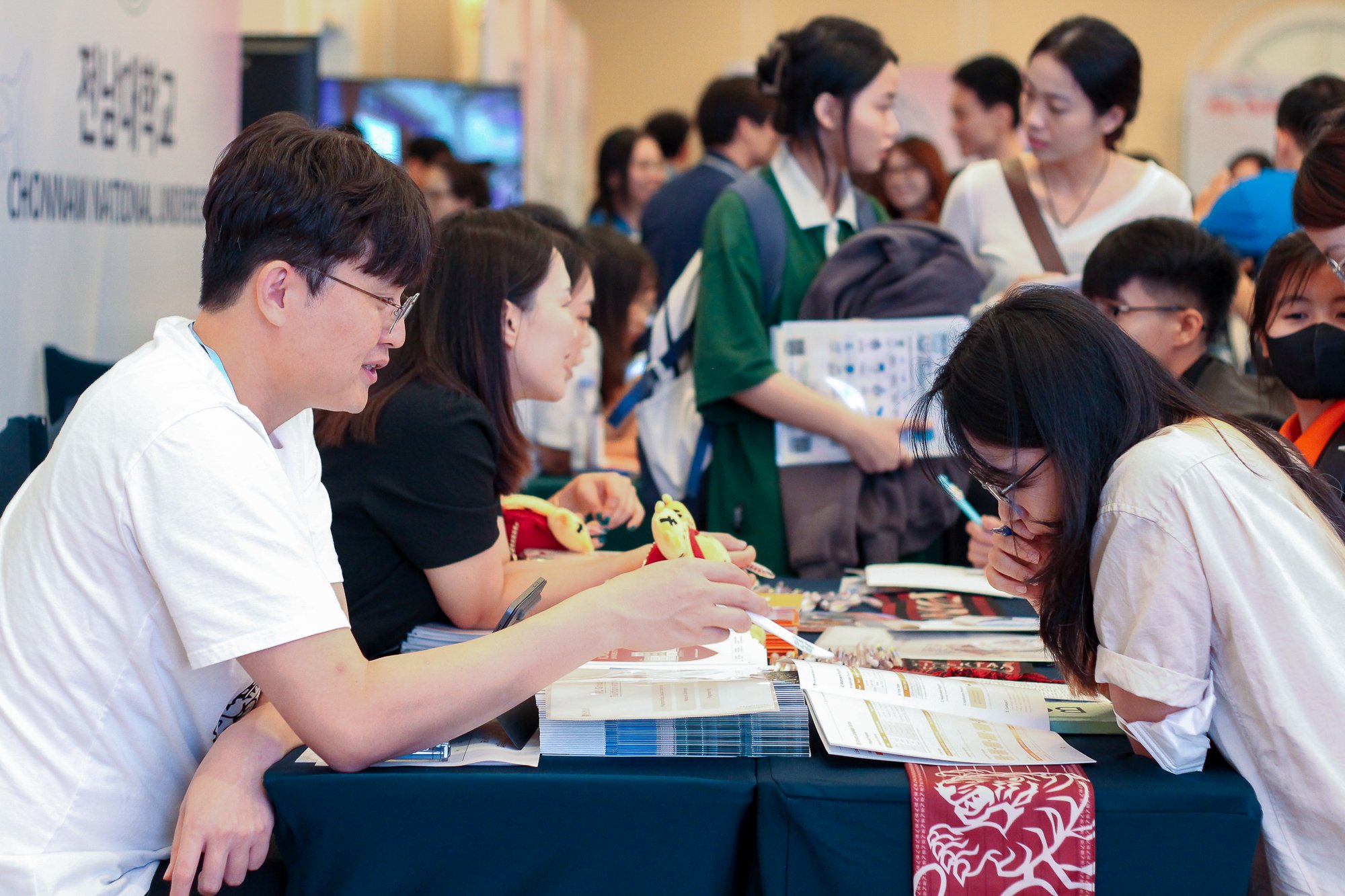
The Korean study abroad seminar organized by the Korean government in Ho Chi Minh City in November. This is also the destination that currently attracts the most Vietnamese students.
Expanding Vietnamese enrollment
A highlight of 2024 is the addition of more recruitment consulting activities taking place at the government and school levels in Vietnam. For example, this is the first year that the New South Wales (Australia) government has organized a study abroad exhibition in Vietnam, and it is also the first time that the German Consulate in Ho Chi Minh City has coordinated with other government agencies of this country to organize a career orientation and vocational study abroad consulting session for Vietnamese people.
In addition, this is also the first year that the Macau Education Authority (China) and all universities in this administrative region come to Vietnam to provide admissions consulting, and many of the world's top universities in Malaysia, Korea, etc. also come to Vietnam for the first time to provide consulting. Singapore University of Management also officially opened a representative office in Vietnam in April and is the first university in Singapore to do so.
In terms of policy, some study abroad countries have also introduced more open regulations. For example, the US and New Zealand are further speeding up the processing time for student visa applications for Vietnamese people. Many areas in Korea have built specialized units to support international students living locally, of which the Busan International Student Support Center (BISSC) is a pioneering model that many other places are learning from.
Meanwhile, Hong Kong recently allowed international students to work part-time, instead of being limited to 20 hours per week on campus or having to do internships related to their major during the school year and during the summer break as before. Singapore also relaxed its settlement regulations in August, allowing student pass holders to apply for permanent residency in the island nation if they pass at least one national exam or if they are participating in an integrated program.
Many countries increase scholarships
Not only have the government and schools in many countries opened up their enrollment, they have also increased the number of scholarships for Vietnamese students. In November, the government of New Zealand announced the award of government scholarships for Vietnamese university students (NZUA) worth more than VND3.1 billion, making it the first English-speaking country to offer government scholarships from high school to post-graduate studies in Vietnam.

Parents and students listen to representatives of New Zealand universities share at a conference organized by the government of this country in October. This is the first English-speaking country to have enough government scholarships from high school to post-graduate in Vietnam.
In the same move, the GREAT scholarship program, jointly implemented by the British government and the British Council, recently reopened applications, adding 3 more scholarships for Vietnamese people with a minimum value of 10,000 GBP (320 million VND) each. This program has also continuously increased scholarships for Vietnamese students in recent years, currently the number has tripled compared to the first year of implementation.
Many universities and colleges in countries with many Vietnamese students, such as the US and Canada, are also increasing the number and value of scholarships for Vietnamese people, according to experts. In addition, Asian destinations such as Hong Kong, Macau, Taiwan, Thailand, Malaysia, South Korea and European countries such as Italy, France, and Germany also have many scholarships from the government or universities, with values up to full.
Some destinations tighten regulations on studying abroad
Along with the signs of welcoming international students, many countries have also introduced many strict regulations, even restricting international students to study in order to reduce immigration. The earliest of these was the UK, when this country earlier this year banned international students from bringing their relatives, except those studying postgraduate or government-funded research courses, along with many other regulations with the goal of cutting 300,000 net immigrants each year.
With the same goal, Canada has continuously issued many tightening regulations over the past year, from limiting the issuance of study permits, increasing foreign language standards and other requirements for post-graduation work permits, and stopping allowing Vietnamese students to study without financial proof. On the other hand, this country has recently allowed international students to work more, up to a maximum of 24 hours/week instead of just 20 hours as before.
The Netherlands recently enacted the Internationalization Balancing Bill, which aims to reduce English-taught programs and increase tuition fees for international students. Meanwhile, after a long wait, Australia officially rejected the bill to cap enrollment and change its student visa policy. However, this has caused many educational institutions and study abroad companies to be apprehensive because they fear that the current government will use the new policy to limit enrollment.

Vietnamese students learn about opportunities to study in Australia at a seminar organized by the New South Wales government in September.
In China, from 2024, the government requires all international students who want to apply for government scholarships or apply to one of the 142 schools in the "Song Nhat Luu" project to take the university entrance exam online at home or directly at the school in China, and this regulation only applies to the undergraduate program. Depending on the major applied for and the language of training, candidates will be divided into sub-groups with the corresponding number of exam subjects.
The above policy changes in the past year have more or less affected the reputation of popular study abroad destinations, according to reports conducted over the past year. For example, a recent survey of 1,082 study abroad companies from 68 countries and territories conducted by education group Navitas showed that international students around the world are less fond of Australia, the UK and Canada than before.
Source: https://thanhnien.vn/nam-2024-thi-truong-du-hoc-bien-dong-nguoi-viet-huong-nhieu-loi-ich-18524123116560855.htm


![[Photo] General Secretary To Lam, Secretary of the Central Military Commission attends the 12th Party Congress of the Army](https://vphoto.vietnam.vn/thumb/1200x675/vietnam/resource/IMAGE/2025/9/30/9b63aaa37ddb472ead84e3870a8ae825)
![[Photo] Solemn opening of the 12th Military Party Congress for the 2025-2030 term](https://vphoto.vietnam.vn/thumb/1200x675/vietnam/resource/IMAGE/2025/9/30/2cd383b3130d41a1a4b5ace0d5eb989d)
![[Photo] The 1st Congress of Phu Tho Provincial Party Committee, term 2025-2030](https://vphoto.vietnam.vn/thumb/1200x675/vietnam/resource/IMAGE/2025/9/30/1507da06216649bba8a1ce6251816820)
![[Photo] President Luong Cuong receives President of the Cuban National Assembly Esteban Lazo Hernandez](https://vphoto.vietnam.vn/thumb/1200x675/vietnam/resource/IMAGE/2025/9/30/4d38932911c24f6ea1936252bd5427fa)

![[Photo] Panorama of the cable-stayed bridge, the final bottleneck of the Ben Luc-Long Thanh expressway](https://vphoto.vietnam.vn/thumb/1200x675/vietnam/resource/IMAGE/2025/9/30/391fdf21025541d6b2f092e49a17243f)


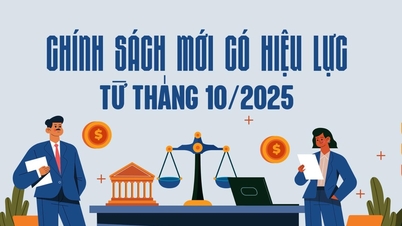

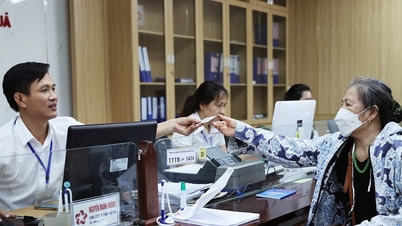







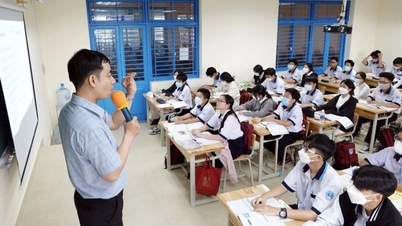
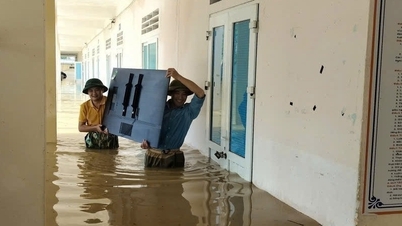



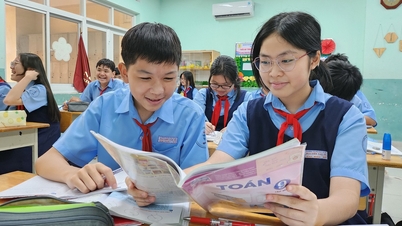

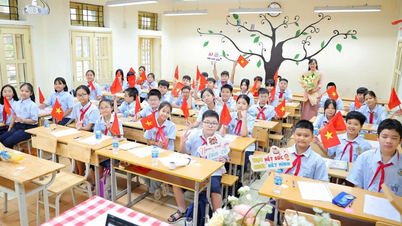
















































































Comment (0)